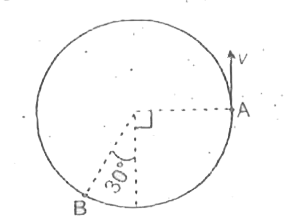If a cyclist takes one minute to complete half revolution on a circular path 120 m radius. What is the average velocity?
1m/s
3.14m/s
2m/s
4m/s
The correct Answer is:B
Step by step video solution for If a cyclist takes one minute to complete half revolution on a circular path 120 m radius. What is the average velocity? by Physics experts to help you in doubts & scoring excellent marks in Class 11 exams.
Updated on:21/07/2023Similar Questions
Earth completes one revolution round the sun in 365.25 days. What is the angular velocity ?
View SolutionA satellite moving in a circular orbit at an altitude of 1000 km completes one revolution round the earth in 105 minutes. What is (z) its angular velocity and speed? Radius of the earth =6.4×106m.
View Solution
Knowledge Check
A cyclist moving a car circular track of raidus 40 cm completes half a revolution in 40 s. Its average velocity is
AzeroB4πms−1C2cms−1D8πms−1
A rotating, rigid body makes one complete revolution in 2s. What is its average angular velocity?
View SolutionA tangential force of F = 1.5 N acts on a particle of mass m = 2 kg revolving in a circular path of radius r = 3 m. What is the work done by the torque for a complete revolution of the particle ?
View SolutionA particle travels two and a half revolutions of the circle of radius R in time t. The ratio of the average speed of the particle to the magnitude of the average velocity in this time interval is
View SolutionA body is orbitting around the earth at mean radius 9 times as great as the orbit of a geostationary satellite to how many days it will complete one revolution around the earth and what is its angular velocity ?
View SolutionA particle of mass m moves with constant speed v on a circular path of radius r. Find magnitude of average force on it in half revolution.
View SolutionIf and object completes 49 revolutions in a minute around a circular path with a speed 7ms−1 find the radius of the path.
View SolutionA particle of mass m moves with constant speed v on a circular path of radius r as shown in figure. The average force on it during its motion from A to B is

View Solution
